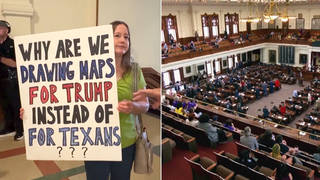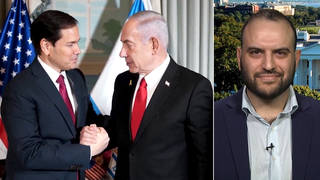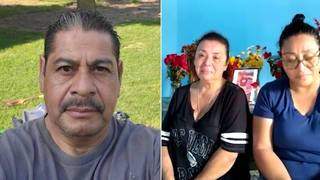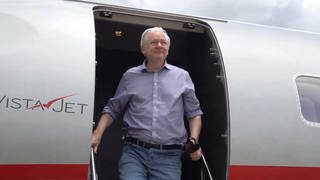
Guests
- Jennifer Robinsonhuman rights attorney and barrister with Doughty Street Chambers in London who has been advising Julian Assange and WikiLeaks since 2010.
A growing number of politicians, including Australian Prime Minister Anthony Albanese, are calling on the United States to drop its case against WikiLeaks founder and Australian citizen Julian Assange, who has been locked up for four years in London’s Belmarsh prison awaiting possible extradition to face espionage and hacking charges for publishing leaked documents about U.S. war crimes in Iraq and Afghanistan. Among Assange’s supporters is Australian human rights attorney Jen Robinson, who has been a legal adviser to Assange since 2010. She joins us from London, where she calls for the case against Assange to be dropped and warns that continuing his prosecution “threatens free speech around the world.”
Transcript
AMY GOODMAN: This is Democracy Now!, democracynow.org, The War and Peace Report. I’m Amy Goodman, with Juan González, as we turn now to look at the case of Julian Assange as calls grow for him to be freed.
The WikiLeaks founder has been locked up for four years in London’s Belmarsh prison, where he awaits possible extradition to the U.S. to face espionage and hacking charges for publishing leaked documents about U.S. war crimes in Iraq and Afghanistan. He faces up to 175 years in prison in the United States, if convicted.
This comes as a growing number of politicians in Australia are calling on the United States to drop its case against Julian Assange, who is in Australian citizen. In April, 48 Australian lawmakers signed a letter to the U.S. Attorney General Merrick Garland saying the U.S. prosecution of a journalist and publisher has, quote, “set a dangerous precedent for press freedom.” A group of Australian lawmakers also met recently with U.S. Ambassador to Australia Caroline Kennedy. Australia’s Prime Minister Anthony Albanese has also spoken out. In May, he talked about Assange during an interview with the Australian Broadcasting Corporation, ABC.
PRIME MINISTER ANTHONY ALBANESE: Enough is enough. This needs to be brought to a conclusion. It needs to be worked through, including we’re working through diplomat channels. But we’re making very clear what our position is on Mr. Assange’s case. … When Australians look at the circumstances, look at the fact that the person who released the information is walking freely, now having served some time in incarceration but is now released for a long period of time, then they’ll see that there’s a disconnect there. There is nothing to be served by his ongoing incarceration.
AMY GOODMAN: That is the Australian prime minister.
Last week, The Sydney Morning Herald made headlines when it reported the FBI has restarted its probe of Julian Assange, but representatives of WikiLeaks say the U.S. investigation was never closed.
We’re joined now in London by the Australian human rights attorney Jen Robinson, who’s been a legal adviser to Julian Assange since 2010.
Jen, welcome back to Democracy Now! You’re just back from Australia, where you live, where actually President Biden was expected to go for the Quad meeting with the prime minister of Australia, but had to cancel that and return from Hiroshima to Washington to negotiate the debt ceiling legislation. Can you talk about what Albanese now is calling for? And what response do you have to this information from The Sydney Morning Herald that the U.S. has reopened a probe that no one knew had been closed?
JENNIFER ROBINSON: Well, first, great to speak to you again, Amy, and great to be back on Democracy Now!
I’ve just returned from Australia, where I was in Australia for a visit with Stella Assange, Julian Assange’s wife. It was her first trip to Australia, which we had planned to coincide with Biden’s visit to Australia. What Biden would have seen, had he come to Australia, was a huge amount of support both from the Australian public — we saw a huge protest in Sydney against the extradition request and the United States’ prosecution of Assange. We saw a packed-out room of MPs in a cross-party briefing. Now in Australia, we have bipartisan support, so it’s not just our prime minister, Prime Minister Albanese, calling for this case to be brought to an end, it is also the leader of the opposition. And when Stella and I briefed MPs in Parliament, there was standing room only. There was that many MPs from across the political spectrum there wanting to hear from Stella and I about the latest in the case, and who are pushing for this case to be brought to an end. So we’ve seen a sea change in the political response in Australia. We’re seeing polling, unprecedented polling, of an overwhelming majority of the Australian public who support our government in seeking to have this case closed. And the question is now what the United States will do with it.
The story last week about the FBI supposedly reopening this investigation, this is an investigation that has been open for a number of years. This is a Trump administration indictment. We know that the FBI had been conducting inquiries in the interim period. And it’s important to recognize that the FBI reached out to — or, allegedly reached out to a ghostwriter on Julian’s book. This, to us, shows the desperation of the FBI and how they’re grasping at straws in terms of their investigations in this case. There are no new facts in this case. The U.S. government has known the facts that form the basis of this indictment since Chelsea Manning went on trial back in 2012. And the fact that the FBI is now suddenly starting to make inquiries from bit part players is — I think, goes to show the lack of the strength, or lack thereof, of the U.S. case.
JUAN GONZÁLEZ: And, Jen Robinson, I wanted to ask you about other developments in the case, especially concerning the surveillance conducted of Julian Assange while he was in the Ecuadorian Embassy. Spain’s El País had a story headlined “Police omitted folder called 'CIA' from the computer of Spaniard who allegedly spied on Julian Assange.” Who was this Spaniard? And what do you know about this?
JENNIFER ROBINSON: So, in addition to fighting the extradition case and fighting the prosecution of Assange, Julian and our legal team have been fighting back through various different legal actions. There’s the action that I took successfully against the British government for unlawful sharing of information with the United States government as Julian’s lawyer. We have the action against the CIA in the United States, taken by a group of lawyers on Julian’s team who visited him in the embassy, and the Spanish case, which you’ve just raised, where Julian has taken a criminal complaint against David Morales, who was the head of UC Global, the security company that was providing, quote-unquote, “security” inside the Ecuadorian Embassy. But it was revealed by El País in recent years, thanks to whistleblowers, that he was providing information — allegedly providing information to the CIA.
We’ve learned just this week that in the disclosure in those proceedings, in which Mike Pompeo himself has been subpoenaed to give evidence about the nature of this unlawful spying on Julian and on us as his lawyers, which fundamentally flaws the U.S. criminal investigation, that the Spanish police failed to disclose further evidence, including files marked ”CIA,” that further indicate the involvement of the CIA in spying on us as lawyers inside the embassy. This is really important revelations. As Daniel Ellsberg, the Pentagon Papers leaker, said in our extradition case, his case, his espionage case, was thrown out under the Nixon administration for unlawful spying on his doctors. In this case, you’ve seen so much more abuse.
So, a Trump-era indictment, now under a Biden administration, this prosecution is still being pursued, despite widespread and huge amounts of evidence of unlawful spying on lawyers, on the seizure of legally privileged information, and, indeed, plots to kidnap and kill Julian Assange by the CIA in London. At this point, you need to ask — even leaving aside the free speech implications of this case, the First Amendment concerns that are now increasingly being raised by Democrat lawmakers in the U.S. calling on the U.S. to drop this case, there has been so much abuse in this case, and it begs the question: If abuse of this nature was enough to throw out a case under the Nixon administration, why is he still being pursued under the Biden administration?
JUAN GONZÁLEZ: And you mentioned a group of Democrats in Congress pushing for the case to be dropped. Do you have hopes that the Biden administration will stop seeking his extradition and that Julian can be freed?
JENNIFER ROBINSON: We certainly hope that the Biden administration will do the right thing and drop this case. We now have the Australian government and our prime minister coming out hard in support of the case being dropped. We have special relationships with the United States, between Australia and the United States. And this is — the Australian government should be able to make this ask of the United States.
But separate from the international concerns, we are thrilled to see that Democrat lawmakers like Rashida Tlaib, AOC, Ilhan Omar have written to Garland, pointing out the First Amendment consequences of this case, asking for the case to be dropped. And I think the more that there’s noise in Washington pressuring the DOJ to do the right thing, pressuring Biden to do the right thing, then we’ll get to the right outcome. And the right outcome is that this case is dropped.
AMY GOODMAN: Can you talk about the model that the Julian Assange case brings? I mean, let’s remember, we say four years in the Belmarsh prison. But before that, seven years really in captivity in the Ecuadorian Embassy. He had been granted political asylum, but he could never leave the embassy in order to — or, the consulate in order to get to Ecuador, because he was afraid of being arrested and then extradited. But this issue of a publisher facing these espionage and treason charges in the United States? You have Evan Gershkovich, who has been arrested in Russia. The world recognizes the problem with a journalist — they say he was trying to get military secrets. It’s really what journalists do. What did Julian Assange do? He published State Department, Pentagon secrets and, he said, and many people agree, including human rights lawyers around the world, evidence of U.S. war crimes in Iraq and Afghanistan. It may not be convenient for the U.S., but it is the job of a journalist. Can you talk about what this case means for how, then, the U.S. can raise cases like Evan Gershkovich, that he should be freed by Russia?
JENNIFER ROBINSON: Thank you for raising this point, Amy. It is such an important point. First of all is the precedent that’s set by this case. This case means that any journalist anywhere in the world could be extradited and prosecuted in the United States for publishing truthful information. That is creating a dangerous race to the bottom globally. What message does that send to Russia and to China about extraditing and prosecuting journalists who publish the truth about Russia or China?
Then we get to the point of how it diminishes the moral authority of the United States to be able to raise free speech issues. Now, in the Evan Gershkovich case, we’re seeing a case where Russia is using the espionage charges against a journalist for the first time since 1987. So, this is picking up and running with the precedent that the United States is setting at home because of the Assange case. That is dangerous. When you’ve got a country that purports to bring democracy and free speech to the rest of the world prosecuting a journalist for espionage, it is a dangerous situation that we’re in. It threatens the First Amendment, but it actually threatens free speech around the world. And that’s one of the reasons why this case needs to be dropped.
AMY GOODMAN: A final question, and we just have 30 seconds: What would a resolution of this case look like? How would Australia play a role in this?
JENNIFER ROBINSON: We are asking the Australian government to continue to raise this with the president and with the relevant agencies in the United States. We say the right outcome is for the case to be dropped and for Julian to be allowed to return home safely to Australia.
AMY GOODMAN: Jennifer Robinson, I want to thank you for being with us, human rights attorney who’s been advising Julian Assange and WikiLeaks since 2010. She is Australian.
Next up, thousands of people have been evacuated in Ukraine after an explosion damaged a critical dam in Russia-occupied Kherson region. Ukraine and Russia are blaming each other. We’ll go to Kyiv for the latest. Stay with us.











Media Options